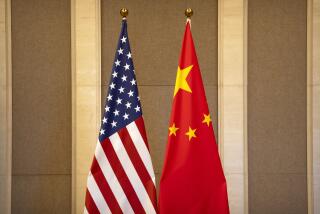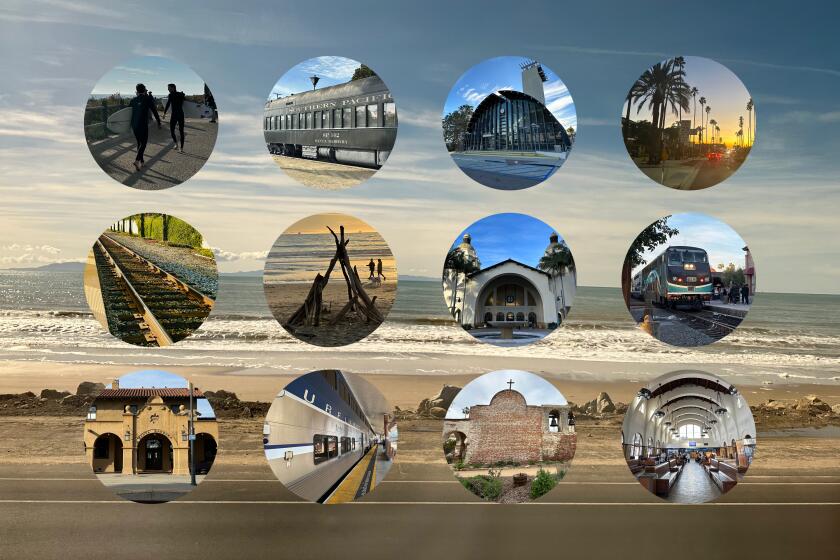Revoking Martial Law Means Little in China
World Travel Watch is a monthly report designed to help you make informed judgments about travel throughout the world. Because conditions can change overnight, always make your own inquiries before you leave home. In the United States, contact the nearest passport agency office; abroad, check in with the nearest American embassy .
Asia
--China: Martial law has been lifted in Beijing, but new laws have been imposed that, in essence, re-create the revoked regulations, banning gatherings in Tian An Men Square and other areas of the city. The practical result will be freer movement throughout the city, including Tian An Men Square, but police will keep a close watch to prevent demonstrations. The lifting of martial law is principally an attempt by the government to improve its international image and reopen channels of foreign investment.
If you are planning to travel independently, it is important to know that air travel within China must be on China’s domestic airline, and it is not possible to book domestic segments of international flights. Domestic flights must also be booked at each stop, and you cannot establish an itinerary taking you from one city to the next without booking each leg as you go.
Train reservations are also hard to get, and many counterfeit tickets are being sold by con men at railway stations.
--India: Unrest continues in Kashmir’s capital of Srinigar. The army was called in recently to quell disturbances after diplomatic efforts failed, and a curfew remains in effect. Exercise caution.
--Mongolia: Political change is reaching even this remote country of only 2 million, in an area almost the size of Western Europe. Thousands of Mongolians demonstrated recently against the ruling party’s monopoly on power, which is the world’s second-oldest Communist system after Moscow’s. Change is likely to occur, but the ruling party is hoping to introduce reforms through dialogue rather than confrontation.
--Nepal: The trade dispute with India, which created a severe shortage of fuel and other staples last summer, is close to resolution. Nepalese and Indian officials recently reached a broad agreement on ending the dispute that exacerbated deforestation in this mountainous country when residents were forced to burn wood.
--Sri Lanka: The political situation remains volatile as the Indian army continues to pull out of the north and east. Indian troops are scheduled to be completely withdrawn by March 31, and rival Tamil groups are fighting with each other to fill the void. Travelers should avoid these regions. Sporadic acts of violence by Sinhalese extremists and other vigilante groups continue in the central and southern parts of the country. Expect police checkpoints and roadblocks, and avoid traveling at night. Check with the U.S. Embassy for current information before going to the ancient sites of Anuradhapura and Polonnaruwa.
Africa
--Liberia: Due to political unrest brought on by a recent coup attempt by dissidents based in neighboring Ivory Coast, travel to the border areas of Nimba and Upper Bong counties should be avoided. The Liberian army remains on alert and continues to man checkpoints in these areas, and travel through some is not permitted between 6 p.m. and 6 a.m. The capital city of Monrovia remains unaffected, and travel in and out of the international airport is normal.
--Mauritania and Senegal: Political conditions along the border of these two countries remain unsettled, including occasional shootings. Travel in the Senegal River region should be avoided between Rosso, near the river’s Atlantic mouth, and the border with Mali south of Bakel. Diplomatic relations between the two countries have been severed, and direct travel between the two is no longer possible, nor is it possible to obtain visas for either country here.
Europe
--Corsica: Two recent bomb attacks by the Corsican National Liberation Front destroyed a hotel and several vacation cabins. The Front, which for years has been protesting French hegemony on the island by targeting tourism facilities, called a moratorium on such attacks last summer but resumed terrorist actions in November. The Front’s objective is to win freedom for the island and to stop what it calls colonizing through tourism.
--Czechoslovakia: A black market in money exchange is thriving in Prague’s Wenceslas Square, where foreigners can as much as triple the official value of their currency, but the practice is illegal and could put both dealer and visitor in trouble with the authorities. Black market transactions are also risky because many of the dealers are unscrupulous and adept at cheating the naive.
--Poland: Poland is expecting a substantial increase in foreign visitors during the coming summer, as more and more travelers are being drawn by the historic events unfolding across Eastern Europe. Travelers should not expect the same kind of comfort they find in the West, however, because Poland’s long-ignored tourism infrastructure will take time and investment to raise to Western standards.
As in other Eastern European countries, the environment has been abused the past several decades, and conditions near industrial areas suffer severe pollution. Neither the Vistula nor the Oder rivers can support fish life.
According to recent reports, a quarter of the country’s farmland is so polluted it is unfit for growing crops, 90% of its river water is undrinkable and half of its lakes are so polluted that even factories can’t use the water.
Currency regulations requiring foreigners to exchange $15 a day have been dropped, and the zloty has been devalued to bring the official rate more in line with reality. The depressed Polish economy is undergoing substantial reform, with Poles bearing the brunt of severe austerity measures to rein in triple-digit inflation. But they haven’t lost their sense of humor, and the irrepressible Poles alone make traveling in Poland worth the occasional inconvenience.
South America
--Suriname: Due to continuing insurgency, travel is dangerous outside the capital city of Paramaribo, Zanderij Airport and the city of Nieuw Nickerie in western Suriname. Avoid road travel between the two cities, and exercise caution on the road between the airport and Paramaribo, especially at night.
Caribbean/Central America
--Guatemala: The main tourist sites of Guatemala City, Antigua and Tikal are generally safe, but there have been recent incidents of armed robbery on the road between Tikal and Belize. Travelers who fly to Flores and go by bus from there to Tikal should have no problems. There have also been occasional roadblocks and robberies attributed to leftist guerrillas on the Pan American Highway near Chichicastenango and Lake Atitlan.
Government forces have increased their presence in these areas and incidents have declined. Travelers should consult the American Embassy for up-to-date information on travel in these areas. Because of sporadic clashes between guerrillas and security forces, travelers should avoid the regions near the Mexican border west of San Marcos and Huehuetenango, and southwestern Peten. Road travel at night is discouraged.
--Haiti: The government recently declared a state of emergency and exiled opposition leaders only three months before scheduled elections, raising doubts that the elections will have any meaning if held. The situation is volatile; avoid non-essential travel.
Southeast Asia
--Singapore: In an effort to make Singapore the world’s first nonsmoking nation, the health ministry recently put into effect a law that essentially prohibits the promotion of tobacco products, including displaying pictures of cigarettes or their brand names in public places. Penalties have been postponed for three months to allow merchants and salespeople to adjust to the new law, punishable by a $5,000 fine and six months in jail.
--Vietnam: The country’s first five-star hotel is open for business, a six-story boat moored off Hero Square in Ho Chi Minh City. Called the Saigon Floating Hotel, it is geared to foreign business people. The hotel’s Japanese owners hope that Vietnam’s economic reforms and withdrawal from Cambodia will spur international business. The floating hotel was originally anchored off Australia’s Great Barrier Reef, but it failed there, and now is part of Vietnam’s push to develop a tourism industry.
Officials have proclaimed 1990 “Visit Vietnam Year,” but the country lacks the facilities to handle large-scale tourism.
For more information on safety concerns in countries you may be visiting, contact the Citizens Emergency Center, U.S. Department of State, Washington, D.C. 20520, (202) 647-5225 .
More to Read
Sign up for The Wild
We’ll help you find the best places to hike, bike and run, as well as the perfect silent spots for meditation and yoga.
You may occasionally receive promotional content from the Los Angeles Times.






